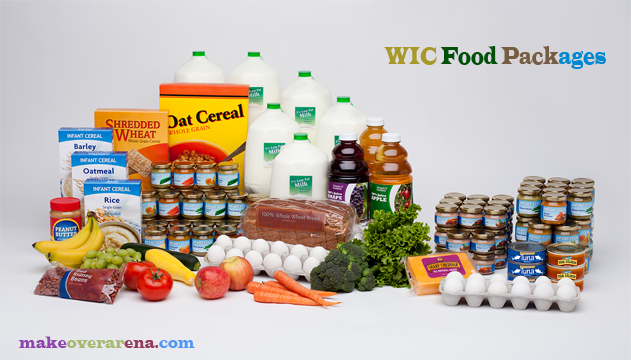The food packages are part of the WIC benefits. These WIC food packages provide supplemental foods designed to meet the special nutritional needs of low-income pregnant, breastfeeding, non-breastfeeding postpartum women, infants, and children up to five years of age who are at nutritional risk. The food packages go with nutrition education from the program and they are the chief means by which WIC affects the dietary quality and habits of participants.

WIC Food Packages
Every now and then new food packages are being added to the existing package provided to WIC participants, mostly in accordance with the Dietary Guidelines for Americans and Infant Feeding Practice Guidelines of the American Academy of Pediatrics.
There are some of the food that are eligible under the WIC. These foods can be bought with the food benefits received on the EBT card known as the WIC cards. The eligible food includes;
Check out: Apeel Gets More Cash to Fight Poverty and Food Insecurity
Fruits & Vegetables: herbs, spices, creamed vegetables, fruit-nut mixtures, peanuts or other nuts, vegetable-grain (pasta or rice) mixtures.
Canned Fish: light tuna as defined by FDA in 21 CFR Part 161.190, salmon as defined by FDA in 21 CFR Part 161.170, sardines, mackerel (ONLY N. Atlantic Scoumber scombrus, Chub Pacific Scomber japonicas, or Jack Mackerel)
Whole wheat bread and other whole grains: whole wheat macaroni products.
Juice: any fruit and/ or vegetable juice or juice blends (e.g. orange, grapefruit, apple, grape, pineapple, tomato, cranapple), fresh, single-strength, from concentrate, frozen, canned, shelf-stable.
Eggs: fresh eggs (with white or brown shells), dried egg mix, pasteurized liquid whole eggs. Hard-boiled eggs may be issued to homeless participants at the state agency’s discretion.
Check out: Ohio EBT Card Guide: Things you can buy and How to Apply For EBT Card in Ohio
WIC-eligible Nutritionals
concentrated liquid, powdered, ready-to-feed (RTF), or ready-to-use (RTU). What the program does not allow are medicines or drugs, enzymes, herbs, or botanicals, oral rehydration fluids or electrolyte solutions, flavoring or thickening agents, sports or breakfast drinks, feeding utensils or devices (e.g., feeding tubes, bags, pumps) designed to administer a WIC-eligible formula, hyperalimentation feedings (nourishment administered through a vein).
Yogurt: drinkable yogurts and yogurts sold with accompanying mix-in ingredients such as granola, candy piece, honey, nuts, and similar ingredients are not allowed by the program.
Milk: whole, reduced-fat, low-fat, or nonfat, cultured milk, evaporated, dry (calcium-fortified) milk, Lactose-reduced, and lactose-free milk, Acidified milk, Shelf-stable, and Flavored or unflavored. Goat’s milk may be used as a substitute for cow’s milk but this is totally up to the state’s agencies.
Cheese: pasteurized Processed American, brick, natural cheddar, Colby, Monterey Jack, mozzarella and (part-skim or whole), Muenster, provolone, Swiss, and blends like CoJack are authorized. Cheese foods or spreads and imported cheeses are not allowed by the program.
Check out: Alaska Food Stamps Eligibility Guide and How to Renew Food Stamps Benefits
Tofu: tofu that does not contain added fats, sugars, oils, or sodium is approved.
Soy-Based Beverage: it could be flavored or unflavored but it must be fortified.
Mature Legumes: any type of mature dry beans, peas, or lentils in dry-packaged or canned forms (black beans, black-eyed peas, garbanzo beans (chickpeas), great northern beans, white beans (navy and pea beans), kidney beans, mature lima beans (“butter beans”), fava and mung beans, pinto beans, soybeans, split peas, lentils, and refried beans). Baked beans are only authorized for participants with limited cooking facilities.
Breakfast Cereal: Ready-to-eat and Instant and regular hot cereals.
Infant Cereal: Any plain, dry infant cereal (e.g., rice, barley, mixed grain)
Infant Food Fruits & Vegetables: Mixtures with cereal or infant food desserts (e.g., peach cobbler) is not allowed by the WIC program.
Infant Food Meat: Any variety of commercial infant food meat or poultry, as a single major ingredient, with added broth or gravy. Texture may range from pureed through diced. Meat with Added sugars or salt (e.g., sodium) and Infant food combinations (e.g., meat and vegetables) or dinners (e.g., spaghetti and meatballs) are not allowed by the program.
Infant Formula: concentrated liquid, powdered, ready-to-feed (RTF)
These are the food packages and there are specific requirements for the constituents of each of the food items that have been stated above.
Check out: South Carolina EBT Card Guide: How to Know the Balance on Your South Carolina



